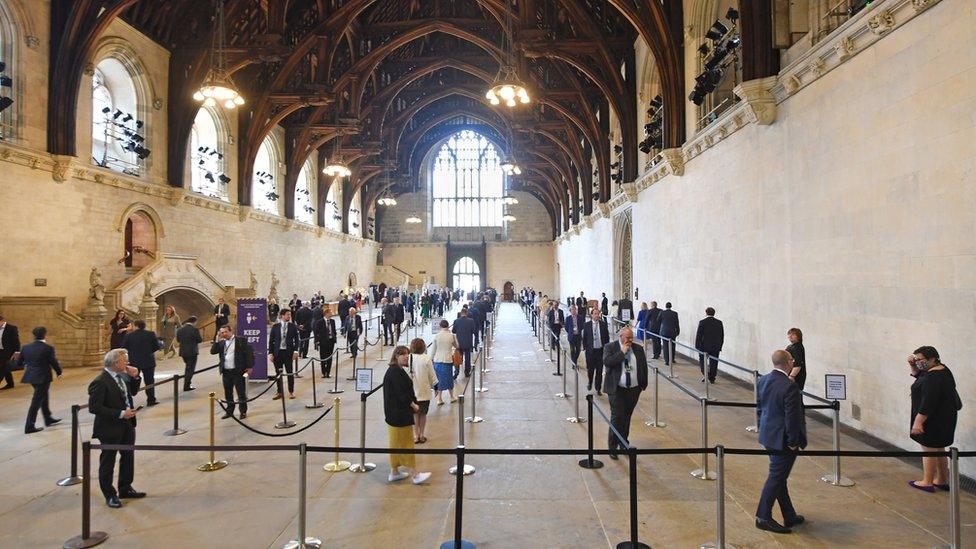Coronavirus: Discrimination row over MPs queuing up to vote
- Published
- comments

The queue to vote in the House of Commons stretched into Westminster Hall
MPs who cannot attend Parliament for age or medical reasons will be able to question the government remotely but not vote, says Jacob Rees-Mogg.
It came as MPs trooped through the Commons in socially-distanced lines to vote for an end to voting from home.
Commons Leader Jacob Rees-Mogg said another vote will be held on Wednesday to allow those who cannot attend in person to take part in debates.
But critics say not allowing that group to vote remotely is "discriminatory".
MPs have been using a "hybrid" system, with some in the Commons chamber, and some appearing via video link, since mid-April and some votes had been held remotely for the first time in Parliament's history.
But Mr Rees-Mogg has scrapped that system, saying it does not allow MPs to properly hold the government to account and they must attend Parliament in person.
'Invaluable role'
Under the new plan, in place until 7 July, Speaker Sir Lindsay Hoyle has had to come up with a physical voting method that respects coronavirus guidance from Public Health England.
It has been strongly criticised by MPs from all sides of the House, who warn it will exclude vulnerable MPs and those with caring responsibilities.
A number of Scottish MPs also said they worried that making the long journey to and from Westminster risked endangering their families and constituents.
But Mr Rees-Mogg said: "This House plays a invaluable role in holding the government to account and debating legislation which can only properly be fulfilled when members are here in person."
A bid by procedure Committee chairwoman Karen Bradley to allow remote voting to be allowed to continue failed to pass by 57 votes.
MPs then voted on the government's plan, which passed by 261 votes to 163.
Thirty-one Conservative MPs voted against the government, including Ms Bradley and other select committee chairs such as Tom Tugendhat and Greg Clark, and former ministers such as Tracey Crouch and John Redwood.
'Ridiculous'
During the votes, MPs had to queue up outside the Commons chamber to observe social distancing, before walking to the Speaker's chair to say their name and which way they were voting.
The vote on Ms Bradley's amendment took 46 minutes - compared to the usual time of around 15 minutes before social distancing measures were brought in.
The vote on the government's plan took 36 minutes.
Some MPs posted pictures of the queue outside the building or in Portcullis House - a building opposite the Houses of Parliament where many MPs' offices are located.
Labour MP Alex Davies-Jones said the way the vote took place had made her "angry", telling the BBC: "The whole voting system has completely fallen apart. It's ridiculous, dangerous and unsafe.
"If I haven't already had Covid then I'm now resigned to the fact that I definitely will."
Allow X content?
This article contains content provided by X. We ask for your permission before anything is loaded, as they may be using cookies and other technologies. You may want to read X’s cookie policy, external and privacy policy, external before accepting. To view this content choose ‘accept and continue’.

Allow X content?
This article contains content provided by X. We ask for your permission before anything is loaded, as they may be using cookies and other technologies. You may want to read X’s cookie policy, external and privacy policy, external before accepting. To view this content choose ‘accept and continue’.

The government's motion - set to be voted on on Wednesday - states that only MPs who have "self-certified that they are unable to attend Westminster for medical or public health reasons" will be able to take part remotely in some proceedings. They won't be allowed to vote.
Labour MP Chris Bryant raised further concerns about the government's plans in the chamber, saying many MPs were "deeply concerned" that shielding MPs would have to "justify" why they were at home, and that parents dealing with childcare problems "shouldn't have to claim medical reasons".
Hybrid proceedings
The so-called hybrid proceedings have been in place since mid-April, enabling MPs to join proceedings over Zoom via screens in the chamber, and to take part in votes online.
The measures were initially due to end on 12 May, but MPs agreed to a motion from the government to extend them until 21 May - the start of the Whitsun recess.
Some MPs welcomed Mr Rees-Mogg's concession allowing some MPs to take part in debates remotely - but many said it did not go far enough.
Labour's shadow Commons leader, Valarie Vaz said Mr Rees-Mogg's plan was "discriminatory".
She added: "I don't know if the leader is living in another universe but the pandemic is still going on. It is not right, or just, or fair."
The SNP's Westminster leader Ian Blackford said: "The government's official line was if you could work from home then you should.
"Well, we can work from home, we should work from home, because that's the right thing to do - not just for Parliament, but for our family, our colleagues and our constituents."
Robert Halfon: Government making MPs "Parliamentary eunuchs"
Earlier, Tory MP Robert Halfon, who has been shielding at home, told BBC News that scrapping virtual proceedings was "democratically unjust" for MPs who could not return to Parliament, leaving them as "parliamentary eunuchs".
He added: "This stern and unbending attitude of the powers that be is unfortunately why many people sometimes have problems with the Conservative Party."